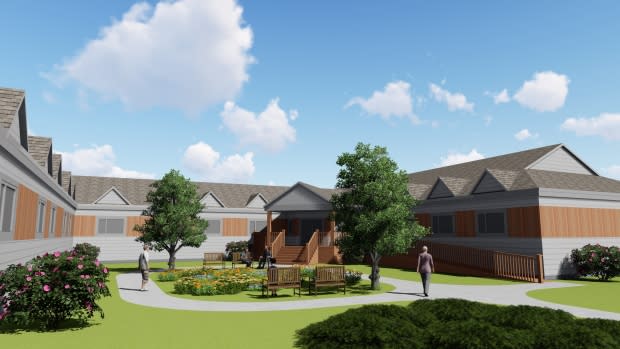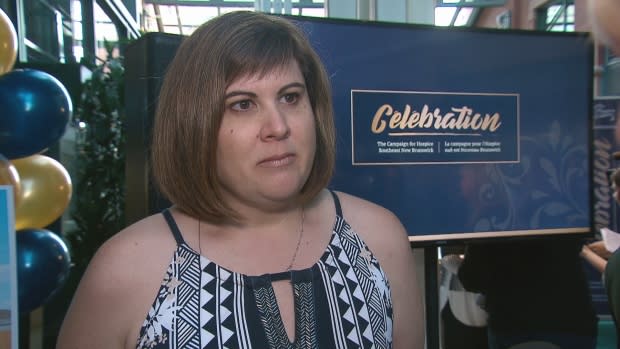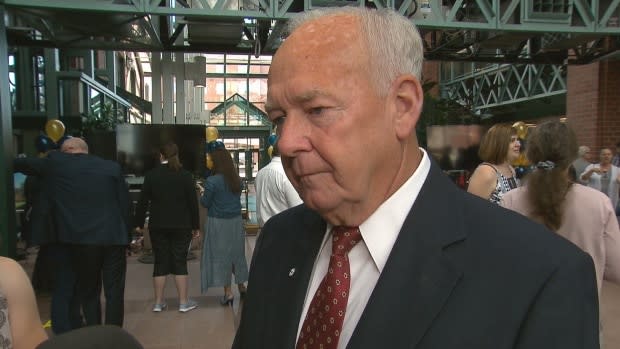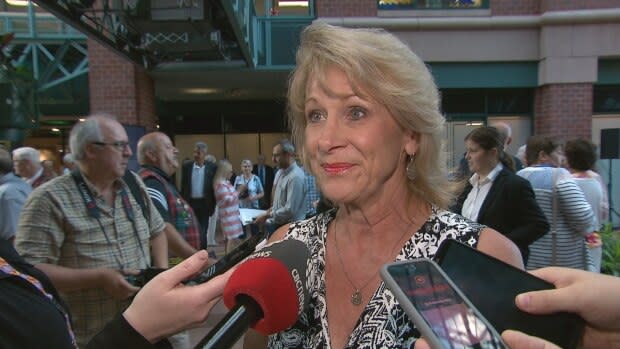Capital campaign launched for 1st residential hospice in Moncton area
Hospice Southeast New Brunswick has launched a $5-million capital campaign to build the first residential hospice in the region.
The bilingual 10-bed hospice is scheduled to open in late 2020 and will include a pediatric palliative care bed.
Dr. Pam Mansfield, a palliative care doctor based at the Moncton Hospital, has been advocating for a facility for years.
"We try as hard as we can for patients who are entering the end of life phase to be able to come to the palliative care unit," Mansfield said.
"But we only have seven beds and we also have patients who are there who have symptoms that aren't controlled as well as end of life. So we don't have enough beds to service the needs of the area even with the two hospitals combined."

Dennis Cochrane, chair of the board of directors of Hospice Southeast New Brunswick, formerly called Hospice Greater Moncton, described a gap in hospice gap in the region. The charitable
"I think we're recognizing that Saint John has had hospice for a number of years, Fredericton, Miramichi is in the process now and Southeast New Brunswick doesn't have that and it's one more thing that we need to add to — it sounds strange—the quality of life, but death is part of life and so it's something that we haven't had and it something we're working very hard to make a reality," said Cochrane, who is also a co-chair of the capital campaign.
The new facility will be built on 2.2 hectares of land donated by the Hum-Lew-Sun Lions Club on Pleasant Street in Moncton's Lewisville area.

Cochrane said it will include private rooms, with a common bathing facility, a meditation room, a sunroom, kitchen, garden, covered deck and even a pet station.
Service New Brunswick Minister Sherry Wilson, appeared on behalf of Justice Minister Andrea Anderson-Mason, who is also responsible for the Regional Development Corporation.
Wilson announced the provincial government is committing $1 million toward the construction of facility, but she said the funding is conditional on the federal government matching the contribution.

She told reporters she wasn't sure when that will happen.
"Not right now I don't. But we're hoping that that's going to be soon announced," she said.
But federal Health Minister Ginette Petitpas Taylor said funding from the federal government is already available.
"In the bilateral agreement with the government of New Brunswick, we have transferred $12.42 million in 2018-2019 to improve home and palliative care services. We will also transfer another $13.45 million in 2019-2020," she said in a written statement.
The provincial government said it will have to sit down with federal officials to OK the use of the money for the project.
Cochrane said the campaign members have lists of people and companies to contact.
They'll also be approaching both hospital corporation foundations.
"We do feel that if our project is successful it will relieve some of the pressure in our two regional hospitals and other hospitals in the region," Cochrane said.

Dr. Janice Cormier, a family physician who works in oncology at the Dr. Georges-L. Dumont University Hospital Centre, said when it comes to end-of-life care, sometimes there's no need for a patient to stay in the hospital, but being at home is not always an option.
"For example, having your partner change your diapers 20 times a day can be quite humiliating and often not accepted," she said.
"Some are home alone and they're scared, they're scared to be in pain in distress. And they're plainly scared to die alone. They don't need the hospital, they need someone. Some just don't want to burden their family with the memory that will stay on from them dying at home. And you want to spare that process to their family."
Mansfield agreed.
"There have been recent studies that show caregivers who look after their loved ones have a huge, huge burnout problem as well as a harder time with bereavement and even just coping with the loss of a loved one," she said.
"So this is going to take that pressure off of families and patients and allow them just to be the mom or the dad or the wife or the husband or the daughter and allow them just to spend that time together."

The campaign's honorary chair is Julie McKenna.
"I have a brother who died recently in the last few years and we were lucky enough that we could bring him home to die and it was a wonderful end of life experience," McKenna said.
"But when I found out … most people died in the hospital with other people in the room, there's no space, there's no comfortable place for the families to have a cup of tea, to be together, I was very surprised that Moncton didn't have something like that, so I was happy to step up and help out."
Cochrane said if the fundraising campaign is in "a good place" this fall, he'd like to put footings in the ground for the building.
He said he's optimistic the facility will open no later than October of 2020.


